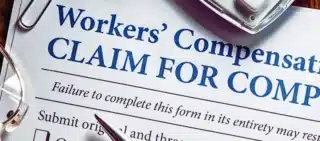
Common Reasons an Employer Won't Report Your Work Injury A total of 101,400 non-fatal work-related injuries and illnesses occurred in...


How long does workers’ comp last in Bloomington, IL? Once your claim is approved, your workers’ compensation benefits may last for several months, years, or your lifetime. The duration of your benefits will depend on the nature and severity of your injury, your prognosis, and your age.

In Illinois, most employers must maintain workers' compensation insurance. Under the Illinois Workers' Compensation Act, employees must be insured from the moment they are hired. There is no required waiting period for coverage.
If you're injured on the job or contract an occupational illness in Illinois, you can file a workers' comp claim for benefits that will cover certain expenses that are directly related to your injury or illness. According to the Illinois Workers’ Compensation Act, you must file your claim within three years from the date of your injury or illness, or two years from the date of your last benefit payment, whichever comes later.
When you suffer a workplace injury or illness, seek medical attention and report the incident to your employer as soon as possible. Your employer should provide you with a claim form to fill out, or you can download the form from the Illinois Workers’ Compensation Commission’s website. Make sure you fill out the form accurately and completely, sign it, and submit a copy of the completed form to your employer or their workers’ compensation insurance provider. Keep a copy of the form for your records.
Your employer is responsible for reporting the injury or illness to the Illinois Workers' Compensation Commission. If you don't report your injury or illness within 45 days of the accident, you can lose your right to receive workers' compensation benefits.
Once your claim has been submitted, the workers' compensation insurance provider will review it and decide whether to accept it or deny it. If your claim is approved, you will receive workers' comp benefits. If your claim is denied, you can work with a workers' compensation lawyer who can help you file an appeal with the Illinois Workers’ Compensation Commission. Your lawyer can also explain the overall process of workers' comp claims, the reasons for denied claims, and what workers' comp benefits cover.
In Illinois, employees who suffer work-related injuries or illnesses can recover different types of wage replacement benefits based on the extent of their disability. Workers' comp benefits are based on the type of disability for which the worker qualifies. The types of benefits that are available to you may include one or more of the following.
Insurance providers use various reasons to terminate or reduce workers' comp benefits for injured workers. However, there are established procedures that must be followed when terminating benefits. It's fairly common and easy for insurance companies to terminate workers’ compensation benefits during the first 180 days of payment if they have a valid reason. However, they must notify the worker in writing of their intent to stop benefits at least 7 days in advance. Common reasons for terminating benefits include:
If you suspect that your workers' comp benefits were wrongfully terminated, you can work with a Bloomington work injury lawyer to file an appeal. However, it's important to act quickly, since there are often strict deadlines for filing an appeal. You can expect to attend a hearing before an administrative law judge. During this hearing, your lawyer will have the opportunity to present evidence and argue your case for the reinstatement of your benefits.
Determining readiness to return to work (RTW) after a workplace injury is a collaborative process involving several factors.
To determine whether an employee is ready to return to work, a licensed physician must assess the injured or ill worker and make sure he/she has received appropriate medical treatment.
The physician must also review the requirements and demands of the patient's job. These include the physical demands (musculoskeletal strength and cardiopulmonary endurance), the mental and psychological demands (concentration, memory, stress), the potential hazardous exposures (chemical, biological, radiation, extreme heat or cold), and the requirements for the use of personal protective equipment. The doctor may ask the patient questions about his/her specific job duties or contact the patient's employer directly.
Your doctor must certify that your injury has healed sufficiently, and you are physically able to perform the essential functions of your job, with or without reasonable accommodations.
This physical assessment, often conducted by a therapist, evaluates your ability to perform specific job tasks, including lifting, bending, reaching, and stamina. It helps determine if modifications are needed to your work environment or duties.
Your pain level should be manageable through medication or therapy, ensuring it won't significantly hinder your job performance or safety.
Your mental well-being is crucial. You should feel emotionally prepared to return to work, having addressed any anxieties or fears related to the injury or work environment.
If your work injury benefits were terminated too soon, or to find out more about how long your workers’ compensation benefits should last, contact our work accident lawyers at Strong Law Offices in Bloomington, IL. We offer free, no obligation consultations, and we won’t charge you any attorney fees unless we recover compensation on your behalf.

Common Reasons an Employer Won't Report Your Work Injury A total of 101,400 non-fatal work-related injuries and illnesses occurred in...

At Strong Law Offices, we have a team of workers' compensation lawyers who understand the financial setbacks and physical limitations...

Common Equipment Involved in Run-Over Accidents Illinois job sites, from construction zones to industrial plants, depend on machinery to stay...